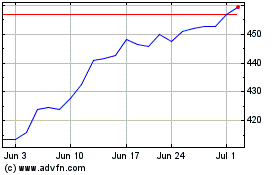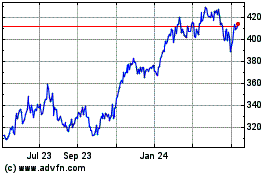Amazon's Alexa and Microsoft's Cortana Will Soon Be Able to Talk to Each Other
August 30 2017 - 3:48PM
Dow Jones News
By Jay Greene and Laura Stevens
Microsoft Corp. and Amazon.com Inc., fierce rivals in cloud
computing, are collaborating in another emerging field: voice
computing.
The companies on Wednesday announced plans to allow their
voice-enabled digital assistants -- Microsoft's Cortana and
Amazon's Alexa -- to work together later this year. The agreement
provides each assistant with capabilities they lacked, and poses
new challenges to Apple Inc. and Alphabet Inc.'s Google, which have
their own voice-enabled assistants.
Amazon customers who use the company's voice-activated Echo
speakers will be able to tap into Microsoft's
artificial-intelligence capabilities by saying, "Alexa, open
Cortana." They can check their Outlook calendar for coming
appointments, for example. At the same time, customers using
computers running Windows 10 will be able to say, "Hey Cortana,
open Alexa," to turn on the lights in their homes or add items to
shopping lists.
By joining with Microsoft, Amazon expands Alexa's reach. Morgan
Stanley estimates Amazon has sold more than 11 million Echo devices
through last year. Cortana is available on the 500 million
computers running Windows 10, though Microsoft said in May Cortana
has 141 million monthly users. Both services also run on apps
available on the mobile operating systems from Apple and
Google.
"This is a great move for Alexa, but also a necessary move,"
said Gene Munster, head of research at venture-capital firm Loup
Ventures. Right now, Alexa is lacking in some aspects such as email
and calendar options, which it gains through the partnership, he
said.
One thing the companies won't share is data. An Amazon
spokeswoman said the companies will only exchange necessary
information to process requests that is consistent with both
companies' privacy policies. "Once you open Cortana, all voice data
goes to Microsoft and not Amazon," she said.
Alexa, which emerged in 2014 when Amazon introduced the Echo,
has focused on consumer and home-automation needs. Cortana, which
made its debut in 2014, works in personal computers as well as
Microsoft's Xbox One game consoles. Cortana's strength is in its
integration with Microsoft's productivity software, said Patrick
Moorhead, an analyst with research firm Moor Insights &
Strategy.
The digital-assistant market is still emerging, with no clear
leader. Apple's Siri is on as many as 1 billion devices, Mr.
Moorhead estimates. The company will start selling its HomePod
speaker later this year, a device that likely will tie into
millions of iPhones' and iPads' calendar and email information.
Google Assistant is on about 150 million devices that run the
latest versions of its Android operating system, Mr. Moorhead said.
The company is racing to catch up to Alexa with Google Home, a
voice-activated speaker similar to Amazon's Echo.
"There are going to be multiple successful intelligent agents,
each with access to different sets of data and with different
specialized skill areas," Amazon Chief Executive Jeff Bezos said in
a statement.
The tie-up is a signal the companies realize the future of voice
assistants may be more about the content rather than how it is
delivered, said Ahmed Bouzid, a former member of the Alexa team and
founder and CEO of Witlingo, which builds voice products for Alexa,
Google and Cortana.
"This development is moving towards that world where it really
doesn't matter if you access the content through Google or Alexa or
Cortana or Siri or Bixby," Mr. Bouzid said.
Write to Jay Greene at Jay.Greene@wsj.com and Laura Stevens at
laura.stevens@wsj.com
(END) Dow Jones Newswires
August 30, 2017 15:33 ET (19:33 GMT)
Copyright (c) 2017 Dow Jones & Company, Inc.
Microsoft (NASDAQ:MSFT)
Historical Stock Chart
From Mar 2024 to Apr 2024

Microsoft (NASDAQ:MSFT)
Historical Stock Chart
From Apr 2023 to Apr 2024
